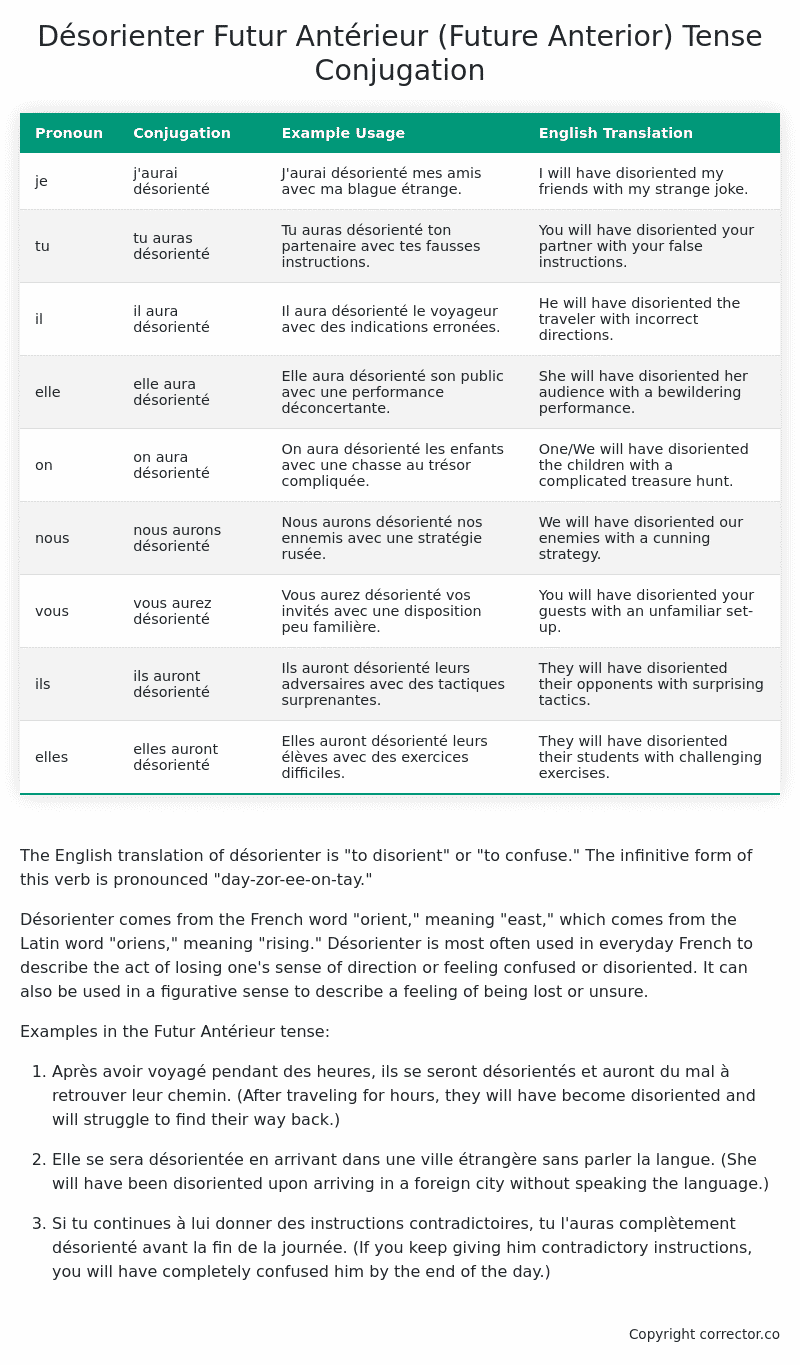Futur Antérieur (Future Anterior) Tense Conjugation of the French Verb désorienter
Introduction to the verb désorienter
The English translation of désorienter is “to disorient” or “to confuse.” The infinitive form of this verb is pronounced “day-zor-ee-on-tay.”
Désorienter comes from the French word “orient,” meaning “east,” which comes from the Latin word “oriens,” meaning “rising.” Désorienter is most often used in everyday French to describe the act of losing one’s sense of direction or feeling confused or disoriented. It can also be used in a figurative sense to describe a feeling of being lost or unsure.
Examples in the Futur Antérieur tense:
-
Après avoir voyagé pendant des heures, ils se seront désorientés et auront du mal à retrouver leur chemin. (After traveling for hours, they will have become disoriented and will struggle to find their way back.)
-
Elle se sera désorientée en arrivant dans une ville étrangère sans parler la langue. (She will have been disoriented upon arriving in a foreign city without speaking the language.)
-
Si tu continues à lui donner des instructions contradictoires, tu l’auras complètement désorienté avant la fin de la journée. (If you keep giving him contradictory instructions, you will have completely confused him by the end of the day.)
Table of the Futur Antérieur (Future Anterior) Tense Conjugation of désorienter
| Pronoun | Conjugation | Example Usage | English Translation |
|---|---|---|---|
| je | j’aurai désorienté | J’aurai désorienté mes amis avec ma blague étrange. | I will have disoriented my friends with my strange joke. |
| tu | tu auras désorienté | Tu auras désorienté ton partenaire avec tes fausses instructions. | You will have disoriented your partner with your false instructions. |
| il | il aura désorienté | Il aura désorienté le voyageur avec des indications erronées. | He will have disoriented the traveler with incorrect directions. |
| elle | elle aura désorienté | Elle aura désorienté son public avec une performance déconcertante. | She will have disoriented her audience with a bewildering performance. |
| on | on aura désorienté | On aura désorienté les enfants avec une chasse au trésor compliquée. | One/We will have disoriented the children with a complicated treasure hunt. |
| nous | nous aurons désorienté | Nous aurons désorienté nos ennemis avec une stratégie rusée. | We will have disoriented our enemies with a cunning strategy. |
| vous | vous aurez désorienté | Vous aurez désorienté vos invités avec une disposition peu familière. | You will have disoriented your guests with an unfamiliar set-up. |
| ils | ils auront désorienté | Ils auront désorienté leurs adversaires avec des tactiques surprenantes. | They will have disoriented their opponents with surprising tactics. |
| elles | elles auront désorienté | Elles auront désorienté leurs élèves avec des exercices difficiles. | They will have disoriented their students with challenging exercises. |
Other Conjugations for Désorienter.
Le Present (Present Tense) Conjugation of the French Verb désorienter
Imparfait (Imperfect) Tense Conjugation of the French Verb désorienter
Passé Simple (Simple Past) Tense Conjugation of the French Verb désorienter
Passé Composé (Present Perfect) Tense Conjugation of the French Verb désorienter
Futur Simple (Simple Future) Tense Conjugation of the French Verb désorienter
Futur Proche (Near Future) Tense Conjugation of the French Verb désorienter
Plus-que-parfait (Pluperfect) Tense Conjugation of the French Verb désorienter
Passé Antérieur (Past Anterior) Tense Conjugation of the French Verb désorienter
Futur Antérieur (Future Anterior) Tense Conjugation of the French Verb désorienter (this article)
Subjonctif Présent (Subjunctive Present) Tense Conjugation of the French Verb désorienter
Subjonctif Passé (Subjunctive Past) Tense Conjugation of the French Verb désorienter
Subjonctif Imparfait (Subjunctive Imperfect) Tense Conjugation of the French Verb désorienter
Conditionnel Présent (Conditional Present) Tense Conjugation of the French Verb désorienter
Conditionnel Passé (Conditional Past) Tense Conjugation of the French Verb désorienter
L’impératif Présent (Imperative Present) Tense Conjugation of the French Verb désorienter
L’infinitif Présent (Infinitive Present) Tense Conjugation of the French Verb désorienter
Struggling with French verbs or the language in general? Why not use our free French Grammar Checker – no registration required!
Get a FREE Download Study Sheet of this Conjugation 🔥
Simply right click the image below, click “save image” and get your free reference for the désorienter Futur Antérieur tense conjugation!

Désorienter – About the French Futur Antérieur (Future Anterior) Tense
Construction
Common Everyday Usage Patterns
Interactions with Other Tenses
For example
Summary
I hope you enjoyed this article on the verb désorienter. Still in a learning mood? Check out another TOTALLY random French verb conjugation!


